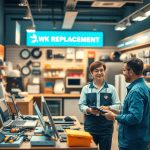
What Are The Advantages Of A Fully Integrated Manufacturer Warranty Program?
September 17, 2024
Which Electronic And Mechanical Replacement Services Best Suit Retail Consumer Needs?
September 19, 2024There’s a crucial link between sales training and your expertise in audio visual equipment. By enhancing your understanding of the technical specifications, features, and benefits of AV products, you can not only build trust with your customers but also elevate your sales performance. This specialized training empowers you to address customer concerns effectively, leading to improved customer satisfaction and loyalty. As you develop your skills, you’ll become a valuable resource for clients seeking advice, ultimately boosting your reputation and success in the competitive AV market.
Key Takeaways:
- Enhanced Knowledge: Sales training provides in-depth understanding of audio visual equipment, enabling sales professionals to confidently explain features and benefits to customers.
- Customer Engagement: Training improves communication skills, allowing sales teams to engage effectively with clients and address their specific needs, thereby increasing customer satisfaction.
- Technical Proficiency: Hands-on training sessions enhance the team’s technical skills, enabling them to troubleshoot common issues and provide valuable insights about product performance.
Understanding Audio Visual Equipment
To truly appreciate the intricacies of audio visual equipment, you must first grasp its fundamental definition.
Definition of Audio Visual Equipment
Equipment involved in audio visual (AV) setups encompasses a diverse array of tools and technologies designed for processing, recording, and displaying sound and visual content. This includes everything from microphones and speakers to projectors and displays. Understanding these elements is crucial for effectively utilizing AV technology in various settings such as corporate events, education, and entertainment.
This type of equipment is integral to delivering dynamic presentations, engaging performances, or immersive environments that resonate with your audience. Recognizing the capabilities and functionalities of these tools empowers you to enhance your professional skills and meet the demands of modern communication solutions.
Types of Audio Visual Equipment
One vital aspect of mastering audio visual equipment is identifying the types that are available and understanding their specific functions. Here is a breakdown of some common audio visual tools:
| Microphones | Capture audio from speakers or instruments. |
| Speakers | Project sound to audiences. |
| Projectors | Display visual content on surfaces like screens or walls. |
| Displays | Show images and videos using LCD or LED technologies. |
| Mixers | Control audio levels and effects for optimal sound. |
Studying these types of audio visual equipment allows you to understand their unique roles and how they interconnect within AV systems. Familiarity with these tools enables you to create engaging experiences that effectively convey your message. Thou, the more knowledge you acquire, the better you can serve your audience.
Industry Standards and Trends
Standards in the audio visual industry are continuously evolving due to advancements in technology and changing audience demands. Staying informed about these standards ensures that you not only use the most effective equipment but also comply with regulations and best practices within your field. This can range from audio quality benchmarks to visual display standards, impacting the effectiveness of your presentations.
To stay ahead in the audio visual landscape, it’s vital to keep up with trends such as high-definition resolution, interactive technology, and immersive experiences.
Another way to maintain your expertise in AV equipment is by participating in industry events and training programs that highlight new technologies and emerging standards. This constant learning will allow you to hone your skills and adapt to the fast-paced nature of the audiovisual domain.
Keeping an eye on industry trends allows you to anticipate shifts in consumer needs, making you a valuable asset in your field. Always be proactive in seeking knowledge and resources to enhance your understanding. Thou, it’s vital to be aware and equipped with the latest information to outperform expectations in audio visual presentations.

Importance of Sales Training in Audio Visual Equipment
Clearly, sales training plays a pivotal role in enhancing your capabilities and expertise in audio visual equipment. As the AV industry evolves rapidly, staying informed and equipped with the right tools to engage customers is important. Proper training not only develops your understanding of diverse products but also enables you to position yourself as a trusted advisor for your clients. This, in turn, creates opportunities for increased sales and customer loyalty.
Building Product Knowledge
Visual aids and dynamic presentations are the cornerstone of audio visual equipment, making it crucial for you to have a comprehensive grasp of the products you sell. Through effective sales training, you learn about the various attributes of different equipment, including specifications, features, and technical advantages. This knowledge empowers you to confidently convey the benefits of each item, helping customers make informed purchasing decisions that align with their needs. By mastering product knowledge, you increase your credibility in the eyes of your customers, fostering trust and reliability.
Understanding Customer Needs
Training not only focuses on product features but also encompasses the importance of understanding your customers’ unique needs and preferences. In the audio visual market, effective sales hinges on your ability to ask the right questions and listen actively. By engaging customers in a conversation, you can uncover their specific requirements, whether it be for a small business presentation, a large-scale event, or complex audiovisual integration in a venue. This tailored approach positions you as a valuable resource, as you can then recommend solutions that provide the best fit for their requirements.
Sales training equips you with techniques to foster deeper connections with customers, allowing you to empathize with their situations and better grasp the nuances of their needs. This approach not only boosts your confidence but also enables you to provide exceptional service that stands out, solidifying long-term relationships with your clientele.
Effectively Communicating Solutions
Understanding how to effectively communicate solutions to your customers is another vital component of sales training. Your role extends beyond merely presenting products; it involves articulating how those products address specific challenges or enhance experiences. Through training, you learn to frame your offers persuasively, demonstrating how your audio visual equipment can deliver tangible results that surpass client expectations.
By utilizing storytelling techniques and relatable examples during your presentations, you can captivate your audience and make your proposal resonate on an emotional level. The power of effective communication lies in your capacity to transform technical details into accessible insights, which helps clients comprehend the value of what you’re offering and motivates them to choose your solution.
The continuous investment in sales training is crucial for honing your ability to convey technical knowledge in a way that is engaging and clear. With a firm grasp on both your products and your customer’s needs, you transform the sales experience into a shared journey, ultimately leading to successful results.

Key Components of Effective Sales Training
All successful sales trainings incorporate several key components that ensure participants leave with a comprehensive understanding of both the product and the selling process. By focusing on important areas such as training needs assessment, curriculum development, and hands-on training techniques, you can significantly enhance your sales skills in the audio-visual equipment sector. Each of these components plays a vital role in not only preparing you to make sales but also in establishing yourself as an expert in your field.
Training Needs Assessment
To develop a robust sales training program, you must first conduct a thorough training needs assessment. This evaluation identifies the specific skills and knowledge deficits among your sales team regarding audio-visual products. By pinpointing these gaps, you can tailor your training approach to better suit your team’s unique requirements, ensuring a more effective learning experience. Utilizing surveys, interviews, and performance evaluations will help you gather valuable insights about where to focus your training efforts.
To ensure that the training remains relevant and effective, it’s crucial to engage the sales team in discussions about their perceptions of the challenges they face when selling audio-visual equipment. Involving them in this process not only fosters a sense of ownership but also helps build a training program that resonates with their actual experiences and needs.
Curriculum Development for Audio Visual Sales
Curriculum development for audio-visual sales should focus on a few key areas, such as product knowledge, customer engagement techniques, and competitive analysis. Each component needs to be interwoven to create a cohesive learning experience that empowers you to handle a variety of sales situations efficiently and confidently. The curriculum should also include the latest trends and innovations in the audio-visual sector to keep you updated.
With an emphasis on practical applications, the curriculum can include various learning formats, such as workshops, seminars, and online modules. By incorporating diverse teaching methods, you can ensure that all learning styles are addressed, allowing you to absorb and retain critical information effectively. Additionally, staying attuned to customer feedback and emerging technologies will help you maintain a curriculum that is both timely and useful.
Hands-on Training Techniques
Effective sales training goes beyond traditional lectures and theories; it emphasizes the importance of hands-on training techniques. By providing you with opportunities to practice selling audio-visual equipment in realistic scenarios, you can enhance your confidence and skillset. This type of immersive experience allows you to learn through trial and error, making it easier for you to understand customer objections and refine your sales approach accordingly.
Moreover, incorporating role-playing exercises and simulations into your training will help you to reflect on your performance and identify areas for improvement. Real-time feedback from trainers and peers is invaluable in highlighting both strengths and weaknesses in your approach. Such practical experience will allow you to develop a more refined and effective sales strategy that you can apply in the field.
Sales techniques become second nature when actively practiced, reinforcing the concepts learned during training. This hands-on approach gives you the confidence to tackle real-life sales situations, making you feel more prepared and knowledgeable when dealing with customers and product inquiries. Ultimately, you will become a more skilled sales professional capable of driving results in the competitive audio-visual market.
Training Methodologies for Sales Teams
After exploring the importance of sales training, it’s necessary to understand the variety of training methodologies that can effectively enhance your expertise on audio-visual equipment. Each methodology serves different learning styles and can significantly impact your ability to communicate product value and technical insights to clients. Below, we investigate into several approaches that can bolster your sales capabilities.
Classroom Training
Training in a traditional classroom setting is a method that allows you to absorb information through direct interaction with instructors and peers. In these sessions, you can participate in structured learning environments, where you can ask questions and get immediate feedback. Classroom training often includes presentations, group discussions, and hands-on activities with the audio-visual equipment, aiding your understanding of the products you are selling.
This method is not without its benefits. By engaging in face-to-face interactions, you build valuable relationships with other sales professionals, fostering an environment of shared knowledge. You can gain insights from the experiences of your peers, allowing you to see challenges and solutions from different perspectives.
Online Learning Modules
Methodologies in training have evolved with technology, making online learning modules an increasingly popular option. These flexible programs allow you to learn at your own pace and often incorporate multimedia elements, such as videos and interactive quizzes, to make the information more engaging. With online learning, you can revisit complex topics, ensuring thorough comprehension of audio-visual equipment features and specifications.
Online modules are particularly advantageous for busy sales teams, as they can fit into your schedule regardless of time or location. The ability to learn asynchronously means you can balance your training with your sales responsibilities, leading to a smoother integration of new knowledge into your daily activities.
Workshops and Demonstrations
On the other hand, workshops and demonstrations provide valuable hands-on experiences that can enhance your technical knowledge and confidence in selling audio-visual equipment. During these sessions, you can interact directly with the products, observe professional demonstrations, and even participate in guided setup processes. This practical knowledge becomes an necessary asset when addressing customer queries about the effectiveness or usability of the equipment.
Demonstrations offer a unique learning opportunity where seeing is believing. When you can physically interact with the technology, you gain a deeper understanding of how it works, which significantly boosts your credibility during sales conversations. You can share firsthand experiences and insights that help clients feel more confident in your recommendations and ultimately, in their purchase decisions.
Role-playing Scenarios
Workshops can also include role-playing scenarios that allow you to practice your sales techniques in a safe and controlled environment. By simulating various customer interactions, you can refine your approach to handling objections, presenting features, and closing deals effectively. This engaging method helps you internalize the training material, ensuring you are well-prepared for real-world situations.
To further maximize learning from role-playing, it’s beneficial to receive constructive feedback from instructors or peers after each scenario. This practice enables you to adjust your techniques based on real-time critiques, enhancing your ability to connect with customers and address their needs more effectively.
Measuring the Impact of Sales Training
Not only does sales training improve your skills, but it also provides a solid framework for measuring the effectiveness of these enhancements. Concerning gauging the success of the training programs, establishing clear parameters is imperative to demonstrate real improvement in your sales capabilities concerning audio visual equipment. By identifying key performance indicators and setting measurable goals, you will be able to quantify the benefits of your training and align them with your company’s overall objectives.
Setting Clear Performance Metrics
To achieve this, think about areas where improvement is needed, such as closing rates, customer satisfaction scores, or even product knowledge assessments. Establishing a baseline for these metrics before training begins allows you to create a comparison for post-training evaluation. You can use tools like surveys, sales performance reviews, or customer feedback insights to capture this baseline data and ensure you cover all necessary aspects of your performance.
Collecting Feedback from Participants
Sales training is not a one-size-fits-all solution, and your experiences should inform future improvements. Gathering detailed feedback from participants is imperative to understanding how effective the training was in providing the information you need on audio visual equipment. This feedback might include the relevance of the content delivered, the effectiveness of the trainers, and the overall impact on your daily sales activities. Establishing a culture of open communication can foster longer-term growth and improvement in your sales strategies.
This feedback is crucial, as it helps identify any gaps in knowledge or areas where further development might be necessary. By actively seeking out participant insights, you are better positioned to adapt the training programs continuously, ensuring they remain relevant and effective in fostering expertise around evolving audio visual technologies.
Analyzing Sales Data Post-Training
Analyzing sales data post-training is a fundamental step in measuring its success. By comparing the performance metrics gathered before and after the training, you can visualize the growth achieved and determine the effectiveness of the program. Strive to monitor not just the historical data but also any new patterns emerging in your sales processes, which might be indicative of changes due to the training you received.
Collecting this data will allow you to make informed decisions moving forward. If you find that certain aspects of your training had a more significant impact on specific sectors or products, you can tailor future training initiatives to enhance those areas even further. Furthermore, simply understanding the ROI of your training efforts showcases your commitment to professional growth and delivering value, enhancing your credibility in the field of audio visual equipment sales.
Continuously Enhancing Sales Skills
For anyone in the audio visual equipment sales industry, the importance of continuous improvement in sales skills cannot be overstated. As technology evolves and consumer needs shift, it’s crucial that you stay informed and skilled to provide the best possible service to your clients. Engaging in effective sales training enables you to refine your techniques, develop new strategies, and ultimately become a more knowledgeable resource for your customers. This constant enhancement in sales acumen not only boosts your confidence but also translates to increased sales performance.
Ongoing Education and Certifications
Sales professionals should actively pursue ongoing education and certifications related to audio visual equipment. These programs not only deepen your understanding of the products you sell but also give you an edge in an increasingly competitive market. By investing time in formal training programs or certifications, you not only upskill but also showcase your commitment to both your personal growth and the success of the business. Staying updated with cutting-edge knowledge gives you the credibility necessary to win customer trust and provide exceptional service.
Keeping Up with Industry Innovations
One of the most critical aspects of enhancing your sales expertise in audio visual equipment is keeping up with industry innovations. The AV industry is characterized by rapid technological advancements and evolving consumer demands. By dedicating time to research and gain insight into new products, trends, and market shifts, you equip yourself with the understanding necessary to effectively convey this information to prospective buyers. Being well-versed in the latest innovations allows you to position yourself as a trusted advisor rather than just a salesperson.
This focus on staying current with industry innovations not only enhances your product knowledge but also enables you to identify emerging trends that could influence buying decisions. Familiarizing yourself with fresh technologies and solutions empowers you to recommend the most suitable options tailored to your clients’ needs, thereby fostering loyalty and increased sales conversions.
Networking Opportunities
On top of ongoing education and staying current with industry trends, networking opportunities are instrumental in enhancing your sales skills. Engaging with other professionals in the AV field provides you with invaluable insights and perspectives. Whether through industry conferences, trade shows, or local meetups, networking allows you to share experiences, gain knowledge, and build relationships that can prove beneficial in your sales efforts. By forging connections with peers, suppliers, and even competitors, you create a support system that can lead to collaborative opportunities and referrals.
Understanding the power of networking allows you to leverage relationships for both personal and professional advancement. When you connect with individuals who share similar goals and challenges, you can exchange strategies that have proven effective in sales. Moreover, these connections may introduce you to new clients, bolster your reputation in the industry, and contribute to your overall success as an audio visual equipment sales professional.
Final Words
Upon reflecting on the numerous benefits of sales training in audio visual equipment, it becomes evident that enhancing your expertise not only boosts your confidence but also elevates your overall effectiveness in the marketplace. By engaging in structured training programs, you gain invaluable insights into the technical aspects of products, which empowers you to communicate their features and advantages with authority and clarity. This understanding directly translates to improved customer interaction, fostering trust and leading to increased sales opportunities. You effectively position yourself as a knowledgeable resource, making it easier to address clients’ specific needs and tailor solutions that resonate.
Moreover, the skills acquired through sales training extend beyond mere product knowledge; they encompass necessary sales techniques, effective communication strategies, and the ability to build rapport with potential clients. You enhance your ability to listen to clients’ concerns and provide solutions that not only meet their requirements but also exceed their expectations. In a competitive landscape where technology continues to evolve, investing in sales training stands as a crucial step in ensuring you remain not just relevant but also a sought-after competitor in the audio visual market. Your expertise becomes a powerful tool that empowers both you and your clients, creating a mutually beneficial environment that drives success.
FAQ
Q: How can sales training improve my understanding of audio visual equipment?
A: Sales training provides in-depth knowledge about various audio visual (AV) technologies, which can enhance your expertise in this field. Through structured learning modules, you gain insights into different types of AV equipment, their functionalities, and their applications in real-world scenarios. Additionally, sales training typically includes hands-on workshops and demonstrations, allowing you to interact with the equipment directly and understand its features first-hand. This comprehensive approach helps in building confidence and expertise when selling or using AV solutions.
Q: What key skills will I develop through sales training related to audio visual equipment?
A: Sales training focused on audio visual equipment will help you develop several necessary skills, including technical knowledge, effective communication, and problem-solving abilities. Understanding technical specifications and how they apply to customer needs is crucial. Training often emphasizes the importance of communicating complex information in straightforward terms, thereby enhancing your ability to inform and educate customers. Additionally, you will learn to troubleshoot common AV challenges, allowing you to provide better solutions and recommendations, which can ultimately lead to increased customer satisfaction and sales success.
Q: Can sales training help me keep up with the latest trends in audio visual technology?
A: Yes, sales training programs often incorporate the latest industry trends and advancements in audio visual technology. By participating in these training sessions, you gain exposure to new products, features, and innovative solutions that are emerging in the AV landscape. This ongoing education ensures that you stay updated with current market demands and technological progress, empowering you to offer the best advice and products to your clients. Regular training sessions also foster a culture of continuous learning, which is crucial in a fast-evolving field like audio visual equipment.

